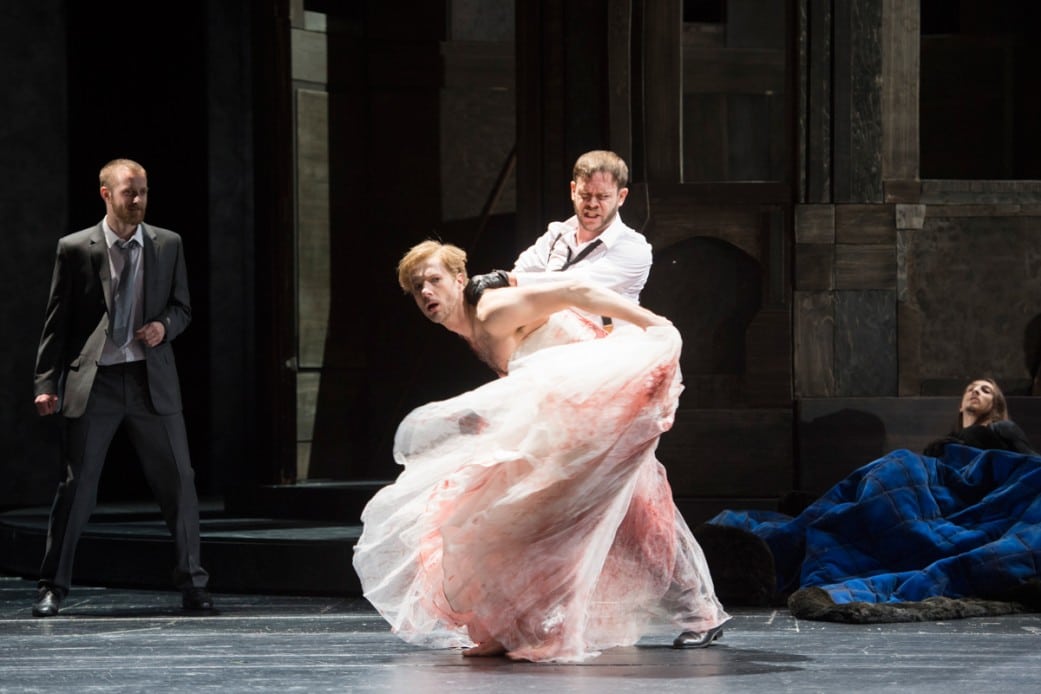Berlin opera critic is attacked for alleged anti-gay bias
mainThe President of the German Theatre Association, Ulrich Khuon, has taken the unusual step of publishing an open letter, accusing a critic on Die Zeit of hostility to the gay community. The review that provoked his response was by Christine Lemke-Matwey, covering Andrea Lorenzo Scartazzini’s new work, Edward II, which premiered two weeks ago at the Deutsche Oper, Berlin.
According to the DO’s website: ‘Swiss composer Andrea Lorenzo Scartazzini is writing a piece of musical theatre that focuses entirely on the role of the outsider Edward II and looks at society’s attitude towards homosexuals both then and now.’
Khuon begins: ‘Stunned and alarmed, I read the review of Christine Lemke-Matwey, the music critic of Die Zeit, who criticized the lack of quality of the opera “Edward II”, blaming it on the homosexuality of the Regieteam, and of some responsible persons at the Deutsche Oper.’
Here’s the open letter in full:

Photo: Monika Rittershaus/Deutsche Oper
Offener Brief des Präsidenten des Deutschen Bühnenvereins, Ulrich Khuon, zum ZEIT-Kommentar von Christine Lemke-Matwey
Verblüfft und erschrocken lese ich die Glosse von Christine Lemke-Matwey, der Musikkritikerin der ZEIT, die die von ihr beanstandete mangelnde Qualität der Oper ‘Edward II.’ in der Deutschen Oper Berlin kurzschließt mit der Homosexualität des Regieteams, ja überhaupt einiger Verantwortlicher in der Deutschen Oper. Das Ergebnis: “jämmerlich”, die Verantwortlichen: “schwul”.
“Schwul” wird hier als Zuschreibung benutzt, die Menschen auf ein einziges Merkmal reduziert – als wäre klar, welche Träume, Haltungen, Wünsche, Geschmäcker der Komponist, Librettist, Intendant haben, weil sie schwul sind; als wäre damit schon gesagt, um was für Menschen es sich handelt. Das ist ein Merkmal diskriminierender Diskurse.
Die Sprache, die Metaphernfelder und Konnotationen, die hier aufgerufen werden sind in höchstem Maße irritierend. “Schwule” bringen “jämmerliche” Kunst hervor, der schwulen Community wird “ein vitaler Opfersinn” unterstellt und in der Inszenierung gehe es “nur um Sex”, anders als in der “heterosexuell grundierten Operngeschichte” – das reproduziert alte, homophobe Bilder und Zuschreibungen.
All dies passt hinein in eine Tendenz forcierter normativer Normalitätswünsche und einen sich schon wieder auflösenden Respekt vor Diversität. “Man wird doch mal sagen dürfen”, lautet die Devise.
Gerade in einer Zeit, in der die Freude am Unterschiedlichen und die Kraft von diversen Gemeinschaften zugunsten einfacher Identitäten vernachlässigt werden, kann sich das Theater als Ort der Kollaboration nicht auf verkürzte Antworten beschränken. Vielmehr kann hier ein gelebter Universalismus, der Differenzen und unterschiedliche Bedürfnisse anerkennt, sie aber nicht wertet, als Entwurf erprobt werden. Das macht viel Arbeit und bedeutet ständige Aushandlung, Reibung, Überprüfung der eigenen Perspektiven und Zusammenhänge – ist aber ein Weg, über sich und die eigenen Horizonte und Begrenzungen hinauszuwachsen.
Ulrich Khuon
Präsident des Deutschen Bühnenvereins

According to Khuon, Christine Lemke-Matwey’s review appeared only in print.





Comments